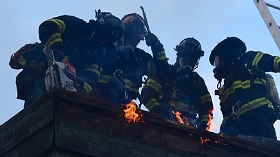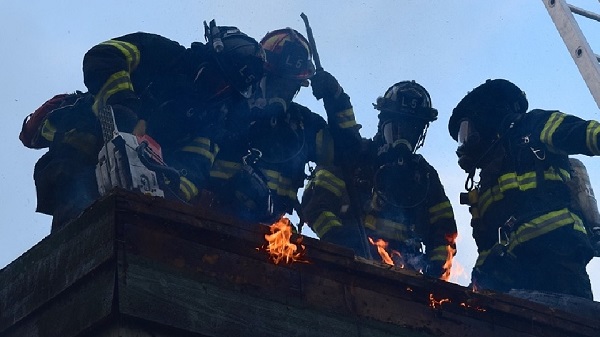

Photo by John Odegard.
By Anne Gagliano
Sleep specialists focus on three synchronizing agents when treating sleep disorders caused by circadian rhythm disruption: light, melatonin, and social/physical cues. In my last column, Part 3 of this series, I covered light and melatonin. Now let’s look at the third agent, social/physical cues. I believe this to be the primary reason firefighters have trouble catching up on sleep and restoring their circadian rhythms after a 24-hour shift. Social/physical cues include a desire to be a part of family life and the pressures to perform daily tasks just as everyone else does. Most night workers prefer to join in the family activities over sleeping during the day. Or, as in the case of hard-working firefighters, they may feel compelled to work a second job on their days off, as society dictates that if you don’t work every day, you’re “lazy.” On average, night workers get two to three fewer hours of sleep per night than the general population. The primary reason for this? The desire to be with family. The secondary reason? The pressure to perform.
For a man to be healthy, he needs seven to eight hours of unbroken sleep; firefighters typically get five or six, even on nights spent at home, because of an inability to fall asleep naturally. Naps can help, but only if they are at least 20 to 30 minutes long. Naps less than 15 minutes long can actually cause more fatigue for the sleep deprived, as they do not even begin to replace unbroken REM sleep, which is what makes you feel rested. It is during REM that hormones are produced, as this is when the endocrine system comes to life. Testosterone levels are influenced greatly by sleep; four hours of sleep produce 200 to 300 ng/dl., whereas eight hours produce 500-700 ng/dl.—that’s a 60 percent difference. Over time, low testosterone levels greatly impact a man’s energy levels, ability to focus, mood, and libido. Low testosterone is also linked to snoring and sleep apnea.
Women tend to need more sleep than men, as their hormones are even more irregular; eight to nine hours of unbroken sleep are the optimum for restoring estrogen levels to the norm, which is essential in battling depression. All of the issues caused by hormonal imbalances in both men and women are vital not only for physical health but emotional health as well, as behavior is what impacts relationships.
To help your firefighter recover more quickly from the ravages of night work, encourage long daytime naps by being flexible about family involvement whenever possible. It is better to miss out a bit, here and there, to restore mood and optimal health. Better for you, firefighter, and better for your family; try not to feel too guilty about it. And firefighter couples, maybe it’s more fiscally prudent if they don’t take on that second job; too much work and not enough sleep may end up costing your family more than the loss of an extra income. One job really is enough, one that’s done well over the long haul. And try to keep the “honey do” list the same length as anyone else’s; just because a firefighter has free days doesn’t mean he should be extra loaded.
Some daytime sleeping tips include the following: Have a quiet room with light-blocking curtains away from the main gathering areas of the house such as the kitchen or other family centers. The kids must be allowed to play; keeping them quiet is tough, as I well know from personal experience. But if you have a quiet “day sleep” room, this will help keep everyone in the family happy; it lets the sleep-deprived firefighter catch up while still allowing the kids to be kids.
Try to avoid loud chores, turn down the TV, and disable the doorbell. Remove the phone from the “sleeping room” or turn it off altogether; a few missed calls will be worth it to restore a firefighter’s mood after a long night.
Try to keep the firefighter’s daily routines as regular as possible. Regularity helps the body clock know when to get “ready” for sleep by releasing the sleep hormone melatonin. Such cues include a consistent bedtime and performing habitual nighttime routines (such as brushing your teeth or bathing or reading). Also, avoid heavy foods and alcohol before bed. Light snacks actually promote sleep (such as cheese and crackers), but heavy greasy foods require the stomach to work hard, and this inhibits sleep. Avoid intense exercise three hours before bed, as this too can wake you up. And it is best to sleep “cold and naked”; a cool room and loose or no clothing helps restore body temperature and blood pressure, which is thrown off by circadian disruption.
Firefighter family, be sensitive to the fact that your firefighter needs rest after a 24-hour shift. Science has proven that two nights of unbroken sleep is the minimum needed to reset the circadian rhythm after just one night of disruption, with four nights of unbroken sleep being the optimum. Those nights off are given for a reason; they help firefighters play the long game by allowing circadian rhythm time to reset, thus avoiding chronic conditions such as digestive disorders and low testosterone. The 24-hour schedule is better than rotating 12-hour shifts, as it gives the body a chance to stick to a typical day/night pattern that is more in sync with family life. Use those off days to their best potential by staying on as regular a schedule as possible. Avoid too much extra work and other irregularities, such as all-night movie and pizza binges, as these will keep your firefighter’s already disrupted body clock perpetually off balance.
Step one in resetting disrupted circadian rhythm is using the properties of light and dark in such ways as providing dark rooms in which to sleep and switching to more red light and less blue. Step two is enhancing the diet with foods rich in melatonin. And step three, social/physical cues, requires the patience, understanding, and support of a firefighter’s family. Patience when their daytime nap forces the family to be “quiet,” understanding in the physical and emotional toll of being up all night, and support when the firefighter struggles to choose sleep over a family activity or extra work.
With these three tools, we firefighter families can help our firefighter keep circadian rhythm disruption to a minimum. Sleep is the firefighter’s friend. With sleep comes the restorative effects of balance to all systems, and this balance will improve health, mood, and family life. An effort to reset the body clock as quickly as possible gives the firefighter the best possible chance of having long-term success in both arenas: firefighting and family.
Anne Gagliano has been married to Captain Mike Gagliano of the Seattle (WA) Fire Department for 30 years. She and her husband lecture together on building and maintaining a strong marriage.

